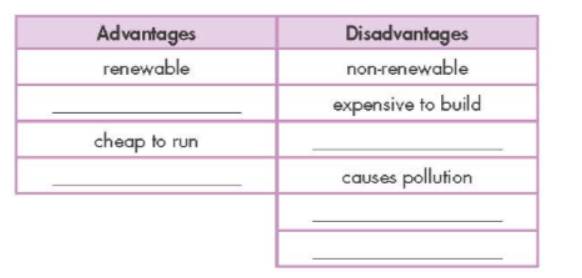1 - C. power plant (nhà máy điện)
2 - A. wind turbine (tua bin gió)
3 - B. solar panel (tấm pin năng lượng mặt trời)
4 - D. nuclear power (năng lượng hạt nhân)
1 - C. power plant (nhà máy điện)
2 - A. wind turbine (tua bin gió)
3 - B. solar panel (tấm pin năng lượng mặt trời)
4 - D. nuclear power (năng lượng hạt nhân)
b. Now, decide on the three best options, and what percentage each source should be.
(Bây giờ, quyết định trên 3 sự lựa chọn tốt nhất và mỗi nguồn năng lượng tương ứng với phần trăm bao nhiêu.)
I think 50% of our energy should come from solar power.
(Tôi nghĩ 50% năng lượng của chúng ta đến từ năng lượng mặt trời.)
a. Read the text and underline the correct title.
(Đọc văn bản và gạch chân chủ đề đúng.)
1. The Advantages of Clean Energy Sources (Lợi ích của năng lượng sạch)
2. Comparing Different Energy Sources (So sánh các nguồn năng lượng khác nhau)
Choosing the best option for energy can be difficult. Coal power is the most popular form of energy today because coal plants aren't expensive to build. However, they can produce a lot of pollution. Other non-renewable energy sources, like natural gas, are cleaner than coal, but they still aren't good for the environment.
Countries are now moving to renewable sources of energy like wind, solar, and hydroelectric power.
Wind and solar power plants are clean and cheap to run, but they aren't cheap to build. Also, wind turbines are noisy and need windy weather to work well, and solar power doesn't work at night. Hydroelectric plants also don't cause pollution, but they can be expensive to build and affect the environment by stopping fish from moving freely. For these reasons, countries and cities usually choose a mix of energy types.
c. Listen and cross out the sentence that doesn't follow the note in "a."
(Nghe và gạch bỏ câu không theo ghi chú ở phần a.)
Coal is cheap and easy to use. (Than đá thì rẻ và dễ sử dụng.)
Wind power is clean and cheap to use. (Năng lượng gió thì sạch và rẻ để sử dụng.)
c. In pairs: Which of the energy sources is the best choice for the future of your country?
(Theo cặp: Nguồn năng lượng nào là lựa chọn tốt nhất đối với đất nước bạn trong tương lai?)
b. Write sentences using the prompts.
(Viết lại câu sử dụng gợi ý.)
1. Coal/cheap/easy/use
Coal is cheap and easy to use. (Than đá thì rẻ và dễ sử dụng.)
2. Hydropower/clean/cheap
3. Wind power/clean/renewable/noisy
4. Natural gas/cheap/non-renewable
5. Motorbikes/popular/cheap/pollution
6. Microwave ovens/convenient/save money
b. Listen. Notice the sound changes of the underlined words.
(Nghe. Chú ý sự thay đổi âm thanh của những chữ được gạch chân.)
Solar power is clean and cheap.
Cars are noisy and expensive.
c. In pairs: Discuss which energies you think are clean to run or cause pollution.
(Theo cặp: Thảo luận về năng lượng nào bạn nghĩ là sạch để tiến hành hoặc gây ô nhiễm.)
d. Read the sentences with the correct sound changes to a partner.
(Đọc câu đúng với sự thay đổi phát âm cùng bạn đồng hành.)
b. Add each word/phrase (5–9) to the correct column. Listen and repeat.
(Thêm từng từ /cụm từ (5–9) vào đúng cột. Lắng nghe và lặp lại.)

5. dangerous (nguy hiểm) 6. cheap to build (rẻ để xây dựng) 7. expensive to run (đắt để tiến hành) 8. clean to run (sạch để tiến hành) |